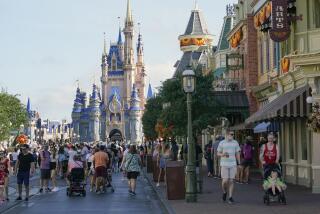Bass Family Parts With Disney Stock
- Share via
The Bass family of Texas sold a 135-million-share block of Walt Disney Co. stock--about 6.4% of all shares outstanding--as the Burbank entertainment concern’s stock hovered close to a seven-year low Thursday.
The family, one of Disney’s largest shareholders for nearly 20 years, sold the shares to raise cash, partly to cover margin calls from its brokers amid a tumbling stock market.
The $2-billion stock sale, one of Wall Street’s bigger single block trades, came as a surprise when Disney learned of the plans earlier this week, according to sources close to the company.
Most of the shares had been held by Fort Worth billionaire Sid Richardson Bass, although Bass spokesman Clive Bode said the stock sale was spread among other family members. Sources said the sale involved the vast majority of Disney shares still held by the Bass family, whose investment dates back to 1984, when the family helped rescue the then-ailing company.
Disney’s stock fell $1.52, or 8.2%, to close at $16.98 on the New York Stock Exchange and at one point was trading as low as $15.50.
The Bass family sold the shares to investment firm Goldman, Sachs & Co., which quickly resold them to a variety of institutional investors and to Disney.
Disney bought 50 million of the shares as part of a plan to repurchase as many as 386 million shares to shore up the stock. On Tuesday, Disney sold $1 billion of bonds, with proceeds earmarked in part to buy back its stock.
In a statement Thursday, Disney Chief Executive Michael Eisner said that the recent terrorist attacks have affected the company’s operations, but that business has been improving each day. And he touted Disney’s long-term growth prospects.
“As the nation slowly regains its equilibrium, so does Disney. We think these trends clearly demonstrate that the current reaction of the economy should not be confused with the country’s long-term outlook, which we believe is as strong as ever.”
Disney Chief Financial Officer Thomas Staggs said the repurchase “reflects our confidence in both the long-term value of our business and in the strength of Disney’s balance sheet.”
Analysts did not seem fazed by the Bass decision.
“People are saying it’s not related to Disney’s financial performance,” said Spencer Wang, an analyst with ABN Amro.
Added Tom Wolzien of Alliance Capital: “This is a really good company in terms of their balance sheet.”
Wall Street sources and Disney investors said the sale was apparently triggered because Bass family members had to meet a margin call, in which an investor is forced to raise cash to provide additional collateral to brokers who have lent them money secured by stock holdings.
Sources said a drop in telecommunications stocks was believed to be one trigger for the margin call.
But Bode said there were several reasons for the sale, adding that the Bass family has been meeting its margin calls amid the current stock market downturn.
“Was it strictly a margin call or cash-raising event? . . . No. There’s a lot of things we did with the cash or plan to do with the cash,” Bode said.
Another ill-fated Bass investment came last year when a partnership with ties to Sid Bass bought 8.5% of Warnaco Co., a New York clothing maker that has since filed for bankruptcy protection. Forbes recently estimated Sid Bass’ net worth at $3.8 billion.
Although the Bass family’s Disney stake over the years has dwindled from a high of 25% when it first invested in 1984, Thursday’s sale nonetheless marks a symbolic end to one of Disney’s most important chapters. The financial backing of the Bass family helped force the 1984 management coup that ushered in a team led by Eisner, which in turn led to one of corporate America’s biggest turnarounds.
The Bass family investment also gave Eisner’s team the breathing room it needed in those early days by providing a barrier to takeover sharks that had been circling the company.
Although not a member of Disney’s board, Sid Bass had considerable clout behind the scenes and was consulted regularly by Eisner on major decisions, especially Eisner’s 1995 decision to spend $19 billion to buy Capital Cities/ABC.
“He was a good partner. He added value to the company,” Disney director Stanley P. Gold said.
Even before the Bass sale, Disney had hit an especially rough patch. This year, Disney cut 4,000 jobs in response to the slowing economy. Responding to a sharp drop-off in tourism since the Sept. 11 terrorist attacks, Walt Disney World is temporarily freezing hiring and cutting back hours for some of its workers.
Most media companies have been hammered in the aftermath of last week’s attacks, but Disney’s stock has been especially hard hit because of its heavy reliance on theme parks and advertising. On Thursday, Standard & Poor’s warned that Disney’s credit rating is at risk of being cut from an A because of an expected slowing at its theme parks and TV networks.
Disney had been struggling with a soft advertising market, a slide in ratings at ABC and a slowdown in theme park attendance before the attacks.
“Those investment concerns have certainly been exacerbated by the attack,” Wang said. “I’m not sure there’s a lot they can do. A lot of this is out of their control.”
*
RELATED STORY
Wall Street: Investors continue to flee stocks on recession worries. A1
More to Read
The biggest entertainment stories
Get our big stories about Hollywood, film, television, music, arts, culture and more right in your inbox as soon as they publish.
You may occasionally receive promotional content from the Los Angeles Times.











